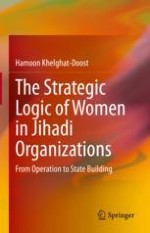2021 | OriginalPaper | Chapter
4. State-Building Jihadi Organizations
Author : Hamoon Khelghat-Doost
Published in: The Strategic Logic of Women in Jihadi Organizations
Publisher: Springer International Publishing
Activate our intelligent search to find suitable subject content or patents.
Select sections of text to find matching patents with Artificial Intelligence. powered by
Select sections of text to find additional relevant content using AI-assisted search. powered by
